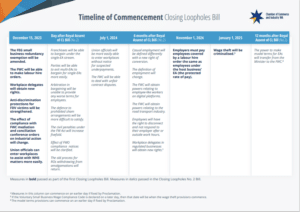The remainder of the Federal Government’s controversial Closing Loopholes Bill, including “intractable bargaining” provisions and changes to casual employment, has passed Parliament.
Editor’s note: This article was updated on February 13 to reflect the Bill passing both houses of Parliament.
However, in the Government’s rush to pass the Greens’ “right to disconnect” laws, an additional amendment will be needed before the laws come into effect in about six months.
The changes to the amended Closing Loopholes Bill (No2) that have passed include:
- Intractable Bargaining Workplace Determinations whereby the Fair Work Commission (FWC) can intervene in a deadlocked dispute between a union and an employer. When a dispute reaches the intractable bargaining threshold, the industrial umpire can only make a decision that will land in favour of the unions.
- Narrowing the definition of casual employment and implementing anti-avoidance provisions with significant financial penalties.
- Creating a new definition of “employment” which will make it more difficult to differentiate between contractors and employees.
- Minimum standards for “employee-like” forms of work in the gig economy and the road transport industry.
- Developing a single national framework for labour hire regulation.
Other changes include:
- Franchisees’ access to single-enterprise bargaining
- Transitioning from multi-EAs
- Model terms for EAs
- Union delegate rights for independent contractors
- Sham arrangements
- Right of entry
- Civil penalties
- Compliance notices
- Withdrawals from amalgamations of ROs
Right to disconnect needs another vote
However, “right to disconnect” laws, which would legally prevent employers from contacting their staff outside of office hours, will require another vote after the Government failed to include the amendment that employers will not be found to be criminally liable if they contravene a FWC right to disconnect order.

“In particular, the ‘intractable bargaining’ provisions will give more power to the unions, rigging the system so the unions can’t lose,” he says.
“The change will completely undermine the system of workplace bargaining, not to mention the ability of the Fair Work Commission to fairly arbitrate disputes.”
Australian Chamber of Commerce and Industry CEO Andrew McKellar says the botched “right to disconnect” amendment was rushed through the Parliament “with unseemly haste, without the scrutiny the rest of the Bill has undergone over months”.
“While the error in the Bill was apparently inadvertent, the result is a complete mess which adds to the grave misgivings business has about this legislation,” he says.
McKellar says negotiations this week slightly improved some aspects of the legislation, “but as a whole, these changes will be a deadweight on productivity and jobs growth”.
Some improvements
Improvements ACCI, of which CCIWA is part of, has advocated successfully for include:
- A clearer definition of casual employment that will provide more certainty to employers.
- Providing businesses with the ability to provide ‘fair and reasonable grounds’ to decline a casual employee’s request to convert to permanent employment.
- Repealing the existing requirement on businesses to offer conversion and providing a single legislated pathway for casuals to convert to permanent employment; reducing the administrative burden on employers.
- Narrowing of the definition of ‘employee-like’, ensuring that tradespersons and independent small businesses are less likely to be captured by a minimum standards order.
Our IR Masterclass has been updated to include all the latest content in the Closing Loopholes Bill.
Given the extent of the changes, it is recommended that all employers review their employment contracts and policies and procedures. Contact our Employee Relations Advice Centre for more information about how CCIWA’s employment lawyers and HR consultants can assist with this on (08) 9365 7660, or via [email protected].










